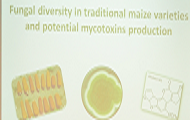
Beatriz Reis Oliveira
iBET - Instituto de Biologia Experimental e Tecnológica, Portugal
Title: Fungal diversity in traditional maize varieties and potential mycotoxins production
Biography
Biography: Beatriz Reis Oliveira
Abstract
Maize is one of the most important crops worldwide that can be used as food, feed and fuel. The cultivation of maize is spread all over the world and highly consumed and processed into other foodstuffs and industrial applications. The contamination of maize crops by filamentous fungi and consequently mycotoxins has been intensively reported along the years being fumonisins, aflatoxins, zearalenone and deoxynivalenol the most reported mycotoxins in maize grains. The aim of this study was to evaluate the occurrence of filamentous fungi in maize samples collected from different regions of Portugal and whether these isolates were able to produce mycotoxins in maize substrates. Therefore, two Portuguese maize traditional open pollinated varieties (‘Fandango’ and ‘Pigarro’) harvested from four different regions of Portugal (Alvarenga, Caldeirão, Lousada and Vouzela) and were screened for the presence of filamentous fungi on its surface and inside the grains.

Isolated fungi were then evaluated for their potential ability to produce mycotoxins. Since the production of mycotoxins by filamentous fungi is matrix specific, all the fungi that were isolated from the maize samples were grown in a maize substrate and only the isolates able to produce mycotoxins were identified at the species level. This is an important study to enrich the knowledge on which species of filamentous fungi are most prone to contaminate and produce mycotoxins in Portuguese traditional maize varieties.

